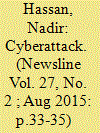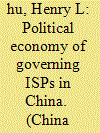| Srl | Item |
| 1 |
ID:
105118


|
|
|
|
|
| Publication |
2011.
|
| Summary/Abstract |
In an information society, granting the Internet Service Provider (ISP) exemption from liability under certain circumstances is an important approach to strike a balance between the interests of the copyright holder, the ISP and the public. Although many countries conditionally provide safe harbour protection for online services, the certainty, feasibility and efficiency of the relevant provisions are different from one country to another. This article reviews China's approach to limitation of the ISP's liability from a perspective of legislation and judicial practice, compares differences in this context between China, the US and EU, and based on which discusses the feasible options for China to increase the certainty of law and inconsistency in judicial practice.
|
|
|
|
|
|
|
|
|
|
|
|
|
|
|
|
| 2 |
ID:
140094


|
|
|
| 3 |
ID:
107289


|
|
|
|
|
| Publication |
2011.
|
| Summary/Abstract |
Internet service providers (ISPs) have played an important role in China's internet regulation regime. This article illustrates how ISPs are governed to serve the government's regulatory goals. This involves examining some of the most extraordinary and profound insights concerning internet governance: the theories of the layers principle, the end-to-end argument and the generative internet. Chinese ISPs have been dependent rather than neutral regulatory intermediaries of the government. Moreover, in addition to telecommunication carriers, the radio and television networks affiliated to the State Administration for Radio, Film and Television (SARFT) are to become a new type of ISP that is capable of choking the free spirit of the internet, as recently demonstrated by the far-reaching policy of "network convergence." This article argues that the policy has the potential to drastically alter the structure and ecology of the internet in China.
|
|
|
|
|
|
|
|
|
|
|
|
|
|
|
|